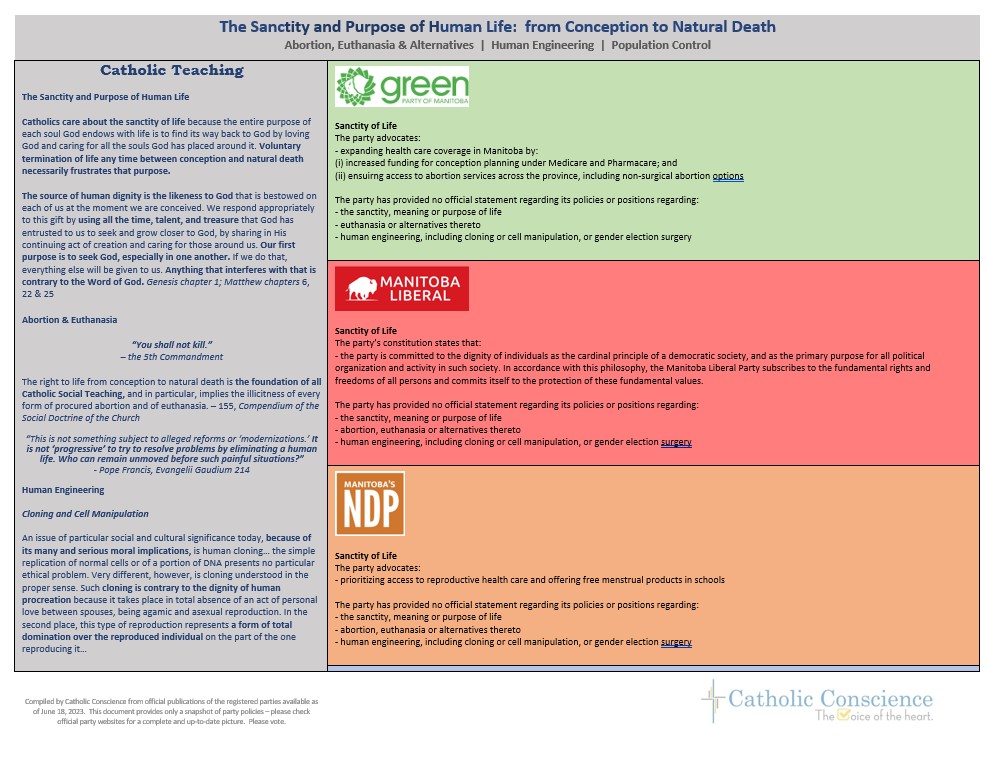Sanctity of Life
Catholics care about the sanctity of life because the entire purpose of each soul God endows with life is to find its way back to God by loving God and caring for all the souls God has placed around it. Voluntary termination of life any time between conception and natural death necessarily frustrates that purpose.
The source of human dignity is the likeness to God that is bestowed on each of us at the moment we are conceived. We respond appropriately to this gift by using all the time, talent, and treasure that God has entrusted to us to seek and grow closer to God, by sharing in His continuing act of creation and caring for those around us. Our first purpose is to seek God, especially in one another. If we do that, everything else will be given to us. Anything that interferes with that is contrary to the Word of God. Genesis chapter 1; Matthew chapters 6, 22 & 25
Abortion & Euthanasia
“You shall not kill.”
– the 5th Commandment
The right to life from conception to natural death is the foundation of all Catholic Social Teaching, and in particular, implies the illicitness of every form of procured abortion and of euthanasia. – 155, Compendium of the Social Doctrine of the Church
“This is not something subject to alleged reforms or ‘modernizations.’ It is not ‘progressive’ to try to resolve problems by eliminating a human life.”
Pope Francis, Evangelii Gaudium 214
Human Engineering
Cloning and Cell Manipulation
An issue of particular social and cultural significance today, because of its many and serious moral implications, is human cloning… the simple replication of normal cells or of a portion of DNA presents no particular ethical problem. Very different, however, is cloning understood in the proper sense. Such cloning is contrary to the dignity of human procreation because it takes place in total absence of an act of personal love between spouses, being agamic and asexual reproduction. In the second place, this type of reproduction represents a form of total domination over the reproduced individual on the part of the one reproducing it…
Cloning for therapeutic use does not attenuate its moral gravity, because in order that such cells may be removed the embryo must first be created and then destroyed. 236, Compendium of the Social Doctrine of the Church
Gender Election
Everyone, man and woman, should acknowledge and accept his sexual identity. Physical, moral and spiritual difference and complementarities are oriented towards the goods of marriage and the flourishing of family life. -224 Compendium of the Social Doctrine of the Church
Men and women with homosexual tendencies must be accepted with respect, compassion, and sensitivity. Every sign of unjust discrimination in their regard should be avoided. – 358 Catechism of the Catholic Church
Population Growth; Birth Control; Family Planning
Judgment concerning the interval of time between births, and that regarding the number of children, belongs to the spouses alone. This is one of their inalienable rights, to be exercised before God… The intervention of public authorities must be made in a way that fully respects the freedom of the couple. All programmes of economic assistance aimed at financing campaigns of sterilization and contraception are to be morally condemned as affronts to the dignity of the person and the family.
The answer to questions connected with population growth must instead by sought in simultaneous respect both of sexual morals and of social ethics, promoting greater justice and authentic solidarity so that dignity is given to life in all circumstances.
All reproductive techniques — such as the donation of sperm or ova, surrogate motherhood, heterologous artificial fertilization — that make use of the uterus of another woman or of gametes of persons other than the married couple, injuring the right of the child to be born of one father and one mother who are father and mother are ethically unacceptable both from a biological and from a legal point of view. – 234-235, Compendium of the Social Doctrine of the Church
Sanctity of Life
The party advocates:
– expanding health care coverage in Manitoba by:
(i) increased funding for conception planning under Medicare and Pharmacare; and
(ii) ensuirng access to abortion services across the province, including non-surgical abortion options
The party has provided no official statement regarding its policies or positions regarding:
– the sanctity, meaning or purpose of life
– euthanasia or alternatives thereto
– human engineering, including cloning or cell manipulation, or gender election surgery
Sanctity of Life
The party’s constitution states that:
– the party is committed to the dignity of individuals as the cardinal principle of a democratic society, and as the primary purpose for all political organization and activity in such society. In accordance with this philosophy, the Manitoba Liberal Party subscribes to the fundamental rights and freedoms of all persons and commits itself to the protection of these fundamental values.
The party has provided no official statement regarding its policies or positions regarding:
– the sanctity, meaning or purpose of life
– abortion, euthanasia or alternatives thereto
– human engineering, including cloning or cell manipulation, or gender election surgery
Sanctity of Life
The party advocates:
– prioritizing access to reproductive health care and offering free menstrual products in schools
The party has provided no official statement regarding its policies or positions regarding:
– the sanctity, meaning or purpose of life
– abortion, euthanasia or alternatives thereto
– human engineering, including cloning or cell manipulation, or gender election surgery
Sanctity of Life
The party states that, as a matter of principle,
– it is committed to building a province where compassionate care for those in need and meaningful support for those who are unable to support themselves are available to all
The party has provided no official statement regarding its policies or positions regarding:
– the sanctity, meaning or purpose of life
– abortion, euthanasia or alternatives thereto
– human engineering, including cloning or cell manipulation, or gender election surgery
Points to Ponder: Life & Human Dignity
Consider discussing the following questions with your local candidates, elected officials, and the parties, and with your family, friends, neighbors, coworkers, and fellow parishioners:
– What limits should be placed on voluntary termination of human life, either prior to birth or at any time before natural death? What can or should be done at the federal level, and what should be left to the provinces, or to private, religious, or other non-profit organizations?
– Are federal restrictions and controls on cloning and the use of human cells, fetuses, and body parts properly crafted? What, if anything, should be done differently including at the national or provincial level? Should there be more discussion of this serious moral issue in our society?
– To what extent should voluntary, elective services that are morally questionable to large numbers of individuals, such as the voluntary termination of life or the voluntary modification of gender, be financed publicly through mandatory taxation? If such services are to be offered, should they be financed by the individuals who elect to access them, or by sympathetic charities, or by possibly-dissenting taxpayers?
– In-vitro fertilization, or IVF, is an increasingly common method by which single parents or couples choose gender and other characteristics of children through the buying and selling of human embryos, sperm and eggs, and eggs, thereby cultivating eugenic attitudes through the process of embryonic selection. Are such practices consistent with Church teachings? If not, are alternatives available, through the Church or through other organizations? Do any limitations exist on such practices? Should they?
Alternatives to Abortion
– What options for support can or should our society, including the church and other non-profit agencies in addition to government, offer to unready, reluctant or unwilling mothers, as alternatives to abortion and to support children cannot raise or do not want? What can or should be done at the local, or federal, or national or provincial level, or by private, religious, or other non-profit organizations?
– In March 2023 the Auditor General of Manitoba issued a follow-up report (https://www.oag.mb.ca/audit-reports/report/follow-up-of-previously-issued-recommendations-2/) pertaining to a number of recommendations it had made to the Legislative Assembly, to responsible provincial authorities, and to licensed agencies in 2019. One hundred and twelve (112) of the recommendations related to the management of foster homes, which along with adoption could be considered an alternative to abortion in the eyes of a mother facing an unplanned pregnancy. Of the 112 recommendations, a total of 4 had been implemented. Six others were declined. The remaining 102 were reported to be ‘in progress.’ They pertain to actions such as ensuring that homes are adequately financed and monitored, and that the homes are operated in compliance with regulations.
– In view of the importance of foster homes to children who may not have parents willing or able to take care of them, what measures should be taken to ensure that such homes are safe, supportive, and operated in accordance with health and other applicable regulations
– who should re responsible for operating safe, clean, and supportive foster homes? Can the province, the Church, or other organizations help?
Palliative Care & Assisted Suicide
– What options can or should be offered by national or provincial or municipal governments, or by private agencies, to families of minors who being encouraged to consider medically-assisted suicide? Is it appropriate to allow minors to consider suicide without consulting their parents?
Table 3.1 below was prepared by Health Canada for its most recent annual report on Socially-Assisted Death (SAD). It shows that assisted suicide has grown each year in Manitoba, up until at least 2021. The chart at right was prepared by the Manitoba Ministry of Health. It indicates that requests for palliative care rose each year between 2012 and 2017. However, no statistics on the demand for or provision of palliative services in Manitoba appears to be available since 2017.
– are adequate facilities for those seeking alternatives to SAD available in Manitoba? If not, why not? Why is it so difficult to find relevant statistics?

Source: Health Canada – Annual Report on Socially-Assisted Death





